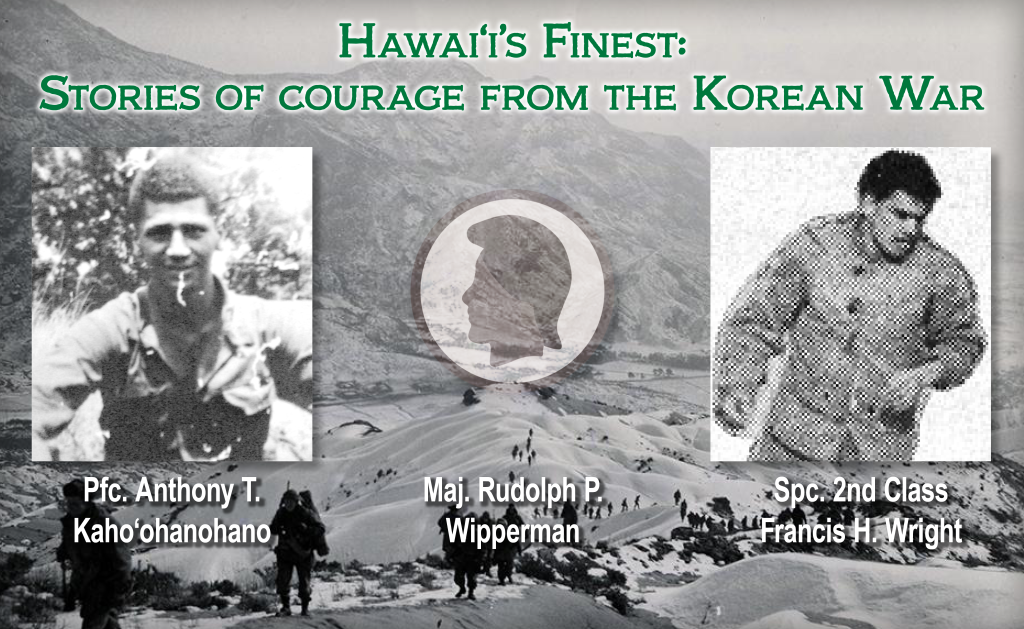
In the shadow of the jagged Korean mountains and in the cold of a brutal war far from home, three sons of Hawaiʻi answered the call with courage, sacrifice, and service that would define not only their own lives, but the enduring legacy of the Hawaiʻi Army National Guard in the Korean War. Their names: Spc. 2nd Class Francis H. Wright, Pfc. Anthony T. Kahoʻohanohano, and Maj. Rudolph P. Wipperman. Together, their stories reflect the quiet strength, tenacity, and honor carried by Hawaiʻi’s Citizen-Soldiers in one of America’s most strenuous conflicts.
Pfc. Anthony T. Kahoʻohanohano – Valor Immortalized
For Pfc. Anthony T. Kahoʻohanohano of Wailuku, Maui, the Korean War would demand everything — and he gave it. One of six brothers who all joined the serve, Kahoʻohanohano began his military career with the Hawaiʻi Army National Guard before transitioning to active duty with Company H, 17th Infantry Regiment, 7th Infantry Division. On Sep. 1, 1951, during the battle for Hill 682 near the village of Chupa-ri, Kahoʻohanohano led a machine-gun squad tasked with supporting friendly defensive positions.
When a larger enemy force launched a fierce assault, his unit was ordered to withdraw. Though wounded in the shoulder, Kahoʻohanohano stayed behind alone, arming himself with grenades and ammunition. From his position, he laid down withering fire, halting the enemy advance until his ammo ran out. Then, in a final act of defiance, he fought hand-to-hand using his entrenching tool before being killed. When U.S. forces counterattacked and reclaimed his position, they found 13 enemy soldiers dead — 11 outside and two inside the emplacement.
His valor inspired a battlefield reversal and a legacy that would be enshrined in the highest traditions of military heroism. Initially awarded the Distinguished Service Cross in 1952, his family fought for decades to see his sacrifice fully recognized. In 2011, Kahoʻohanohano was posthumously awarded the Medal of Honor, ensuring that his heroism would never be forgotten. In 2017 the Hawaiʻi Army National Guard Puunene Armory was dedicated to Pfc. Anthony T. Kahoʻohanohano.
Maj. Rudolph P. Wipperman – The Old Mountain Goat
While some fought with rifles and grenades, Maj. Rudolph P. Wipperman, a physician and Regimental Surgeon from the 299th Infantry Regiment, Hawaiʻi Army National Guard brought healing under fire. Though considered too old by some for frontline service, he demanded to serve in the field, not in the rear. Wipperman quickly found himself embedded with the 31st Infantry Regiment of the 7th Infantry Division, one of the battle-hardened units in Korea.
For two months, he served alongside riflemen in Korea’s rugged terrain, treating the wounded and overseeing medical support in the harshest of conditions. His personal visits to forward aid stations earned him the nickname “Old Mountain Goat,” a title he bore proudly as he climbed treacherous trails to be with his men. He bore witness to the selfless bravery of litter bearers, often carrying wounded soldiers under fire for six or more hours through mountainous terrain.
In a letter to Brig. Gen. Makinney, the Adjutant General of the Hawaii Army National Guard, Wipperman wrote, “It is a privilege to help these men who depend so much on us… It doesn’t seem like a sacrifice, but a privilege to have a part in this great effort.” His service exemplified the heart of the Guard’s medical corps — skilled, devoted and fearless.
Spc. 2nd Class Francis H. Wright – Survivor of Hardship
For Spc. 2nd Class Francis H. Wright, the war’s brutality came not just on the battlefield, but behind barbed wire. Born in Hawaiʻi and a pre-war member of the Hawaiʻi Army National Guard’s 613th Ordnance Company, Wright entered federal service with the Regular Army in 1949 and soon found himself in the Korean War with C Company, 8th Regiment, 1st Cavalry Division.
On Nov. 2, 1950, as United Nations forces surged north toward the Yalu River near Manchuria, Wright was captured by Chinese Communist forces in Ansan, North Korea. He would spend the next 32 harrowing months as a prisoner of war, enduring brutal conditions in North Korean prison camps.
When the Armistice was signed in 1953, Wright was released and returned home to Hawaiʻi. Though physically free, the mental and emotional weight of captivity would follow him for years. Still, his spirit remained unbroken. In February 1954, just months after his release, Wright rejoined the Hawaiʻi Army National Guard. He served faithfully for decades, eventually rising to the rank of Staff Sergeant and transferring to the U.S. Army Reserves in 1988. His journey — from capture to lifelong service — made him a living testament to perseverance, resilience and duty.
Legacy of Service
The Korean War tested the mettle of the United States and of the Hawaiʻi National Guard. Wright’s survival, Kahoʻohanohano’s sacrifice and Wipperman’s steadfast care form a trinity of service — endurance, valor, and compassion — that reflects the very best of what the Citizen-Soldier can offer.
Though the Korean War is often referred to as “The Forgotten War,” the deeds of these three men ensure that for the people of Hawaiʻi — and for anyone who learns their stories — will never be forgotten. Their lives, woven into the legacy of the Hawaiʻi Army National Guard, continue to inspire generations of service members who stand ready, as they once did, to answer the call.
References: Warriors: Pu’ Ali Koa by Lincoln C. Yamashita pp. 68, Hawaii Army National Guard Record, Department of Defense, 1951 December Hawaii Guardsmen
The State of Hawaii, Department of Defense (HIDOD)’ Retiree News does not endorse any of the external hyperlinks listed or posted on this site. This includes linked websites, information, products, or services contained therein. We are a government run website for which transparency and accountability are paramount. HIDOD cannot have the appearance of endorsement and are bound by the HIDOD Social Media Policy concerning political posts being respectful, honest, and accurate. Operational Security will additionally be adhered to. Retiree News does not exercise any editorial control over the information you may find at linked sites. Some of the sites linked to may limit the number of stories you can access without a paid subscription. All links were provided with the intent of meeting the mission of the HIDOD’s version of Retiree News.
